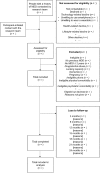Remote assessment of disease and relapse in major depressive disorder (RADAR-MDD): a multi-centre prospective cohort study protocol
- PMID: 30777041
- PMCID: PMC6379954
- DOI: 10.1186/s12888-019-2049-z
Remote assessment of disease and relapse in major depressive disorder (RADAR-MDD): a multi-centre prospective cohort study protocol
Abstract
Background: There is a growing body of literature highlighting the role that wearable and mobile remote measurement technology (RMT) can play in measuring symptoms of major depressive disorder (MDD). Outcomes assessment typically relies on self-report, which can be biased by dysfunctional perceptions and current symptom severity. Predictors of depressive relapse include disrupted sleep, reduced sociability, physical activity, changes in mood, prosody and cognitive function, which are all amenable to measurement via RMT. This study aims to: 1) determine the usability, feasibility and acceptability of RMT; 2) improve and refine clinical outcome measurement using RMT to identify current clinical state; 3) determine whether RMT can provide information predictive of depressive relapse and other critical outcomes.
Methods: RADAR-MDD is a multi-site prospective cohort study, aiming to recruit 600 participants with a history of depressive disorder across three sites: London, Amsterdam and Barcelona. Participants will be asked to wear a wrist-worn activity tracker and download several apps onto their smartphones. These apps will be used to either collect data passively from existing smartphone sensors, or to deliver questionnaires, cognitive tasks, and speech assessments. The wearable device, smartphone sensors and questionnaires will collect data for up to 2-years about participants' sleep, physical activity, stress, mood, sociability, speech patterns, and cognitive function. The primary outcome of interest is MDD relapse, defined via the Inventory of Depressive Symptomatology- Self-Report questionnaire (IDS-SR) and the World Health Organisation's self-reported Composite International Diagnostic Interview (CIDI-SF).
Discussion: This study aims to provide insight into the early predictors of major depressive relapse, measured unobtrusively via RMT. If found to be acceptable to patients and other key stakeholders and able to provide clinically useful information predictive of future deterioration, RMT has potential to change the way in which depression and other long-term conditions are measured and managed.
Keywords: M-health; Major depressive disorder; Observational cohort; Outcome measurement; Passive sensing; Prospective study; Remote measurement technology.
Conflict of interest statement
Consent for publication
Not applicable.
Competing interests
HE is a full-time employee of H. Lundbeck A/S and holds stock and stock optionsin H. Lundbeck A/S. QL, NM and VN are employees of Janssen Research & Development, LLC and hold company stocks/stock options. JMH has received economic compensation for participating in advisotry boards or giving educational lectures from Eli Lilly & Co, Sanofi, Lundbeck, and Otsuka. No other authors have competing interests to declare.
Publisher’s Note
Springer Nature remains neutral with regard to jurisdictional claims in published maps and institutional affiliations.


